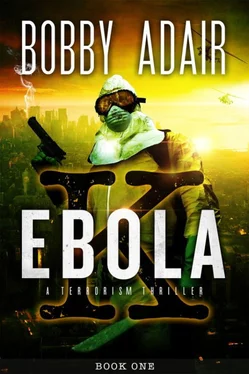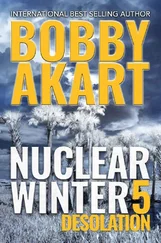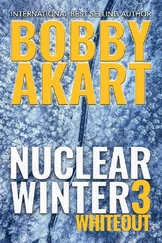“And the mortality rate?” asked Najid.
“Of this strain—if it is a new strain—mortality can’t be known until the bodies are counted. Marburg, the only other Filovirus we know of, kills a quarter of those infected. Ebola Zaire is a vicious strain and kills ninety percent. Other strains kill as few as sixty.”
“With medical treatment will the mortality rate drop significantly?” Najid asked.
“Anecdotally, I must say yes, but Ebola, as frightening as it is, is rare. It hasn’t been studied enough for us to know the effects of treatment for certain.”
Najid eyed the doctor. “So only one in ten might be alive at the end.”
Dr. Kassis gestured to the hospital doors behind them. “You see how it is here. A disease that infects so many so fast does not have to do all the work of killing on its own. There are people in there who with good medical care might survive, but the medical staff and the facilities are overwhelmed. They have run out of everything they could use to treat these people. Many of these will die of secondary infections and causes. The death toll may surpass ninety percent wherever the disease attacks third-world populations.”
Analytical as always, Najid couldn’t help but ask more questions. “That makes sense to me, but is there medical data to back this up?”
Dr. Kassis looked at Najid. “How much do you know of Marburg virus?”
“I read much about these viruses on our trip here. However, I am certain that my knowledge is shallow. Please, tell me what you know.”
“Marburg virus was originally discovered in Germany—in Marburg, of course. So even though the virus was completely new to the doctors and the patients involved, of the thirty-one people infected, only seven died, nearly twenty-three percent.” Dr. Kassis concluded with half a shrug. “Modern country. Modern facilities.”
Najid leaned against the porch railing. “So it is not as lethal as Ebola.”
“No.” Dr. Kassis leaned on the railing beside Najid. “In Durba, in the late nineties, an outbreak of the familiar strain of Marburg and a new strain killed eighty-three percent.” The doctor pointed southeast. “That was in Congo, during a period of upheaval. People had little or no access to medical treatment. Again, in Angola in 2005, during one of the incessant civil wars, Marburg killed ninety percent. The people had no access to medical care. In my opinion, medical care makes all the difference in the survivability of these diseases.”
Najid smiled behind his mask, both for the fact that Dr. Kassis took the risk to volunteer an opinion, and for confirmation that he’d done the right thing in bringing the doctor to treat Rashid.
The doctor continued, “Imagine what will happen with Ebola, with its sixty to ninety percent mortality rate, when the number of cases overwhelms the fragile medical systems of the Third World.” He gestured at the closed doors. “As is happening here. It frightens me.”
“What of this experimental drug, ZMapp?” Najid asked. “I read they are treating infected American doctors with it.”
Dr. Kassis nodded. “And they seem to be responding well.”
Najid snorted disdainfully. “But there is only enough for a few Westerners, while Africans die by the hundreds. By the thousands tomorrow. Perhaps by the millions soon.”
Najid continued to speculate. “And all while the West hides on the other side of the oceans, hoarding their supplies and doctors, frantically working to mass produce their vaccines and treatments. It appears they may even succeed. All while they wring their hands and shed their crocodile tears over dying Africans and dying Arabs.”
The doctor nodded.
“At the end of it, months from now, the disease will reach their shores—that is inevitable—but by then they will be prepared. Over here, most of us will already be dead.”
“That may be true,” Dr. Kassis agreed.
“They will get what they’ve always wanted.”
The doctor took a moment to adjust his mask that felt like it was slipping down his face. “What’s that?”
“Africa, the Middle East, probably even China, and more. Everywhere Islam or communism is strong, the people will suffer and die, leaving the world to the West. That is what the West has always wanted—unchallenged power to exploit the resources of the world. Those of us who remain will be too weak and too few to do anything about it.”
Dr. Kassis adjusted his goggles to cover the top edge of his surgical mask. “Sadly, I can’t disagree with your analysis.”
“What would you do if you were me, I wonder?” asked Najid.
“I can’t—”
“Answer me honestly, Kassis. If only this one time in your life. Tell me what you would do.”
Kassis scraped the toe of his rubber boot on the concrete again, grinding into nothingness whatever was there. “I love your brother like my own son. But to bring him back may bring death to everyone you know. If I were you, I would leave Rashid in my hands to treat. I won’t tell you that I can save him. I can only tell you what I told you before we came, that I can give him a better chance to live. But you should leave this place. Go home and pray.”
When Najid spoke again, Kassis flinched, as though he were expecting harsh treatment for his bad choice to speak the truth. But Najid replied, “We are different men, with different stations in the life, different burdens. Thank you for your honesty, Dr. Kassis. I will ask that from this day forward, you speak your mind openly and honestly whenever I ask. I will not like what you tell me—I assure you I won’t. But I will need your honest counsel.”
“You shall have it then,” replied the doctor.
“Your trepidation will go away in time.” Najid put a hand on Dr. Kassis’s shoulder. “We came here to save my brother, nothing else. But I see now that Allah has led me here for another purpose.”
Najid called to one of his men, commanding him to retrieve the weapons from the SUVs. To the doctor, he said, “If this Ebola is airborne, it will kill many—if not most—men. That is a horror I cannot do anything about. I find it equally horrifying that the West may come through this unscathed. I will not allow that. I will not cede the world to them through my own inaction. Allah put me here for a reason. And that reason is to make this decision. When this disease ravages mankind, it will not be only brown bodies on the funeral pyres and in the mass graves.”
Austin stepped over arms and legs sprawled off the sides of mats and cots as he made his way to the center aisle. When he was in front of the doctors, he asked, “Is it really airborne? Did it mutate?”
The Italian didn’t say anything.
Dr. Littlefield said, “Austin, I hope to God we’re wrong. But that seems to be the case.”
“We can’t know for sure without testing,” Dr. Giovanni said. “Regardless, transporting that boy is the stupidest thing that can be done for him and for public health.” He pointed at the front doors through which Najid and his men exited. “That man is an idiot.”
“We need to keep this strain isolated in Kapchorwa,” Dr. Littlefield added. “We can’t let Rashid leave.”
Austin pointed at the door. “What about those guys? How are you going to keep them here?”
“They’ll listen to reason,” Dr. Littlefield replied.
The Italian doctor said, “It won’t matter. I need to get my phone and make a call. It’s in my pocket but I can’t take it out, not in here. I need to get this suit off, and—”
“Is it a satellite phone?” Nurse Mary-Margaret asked. “If it is a cell phone you’ll have to call when you’re on the road back to Mbale. Our network is down.”
Читать дальше












